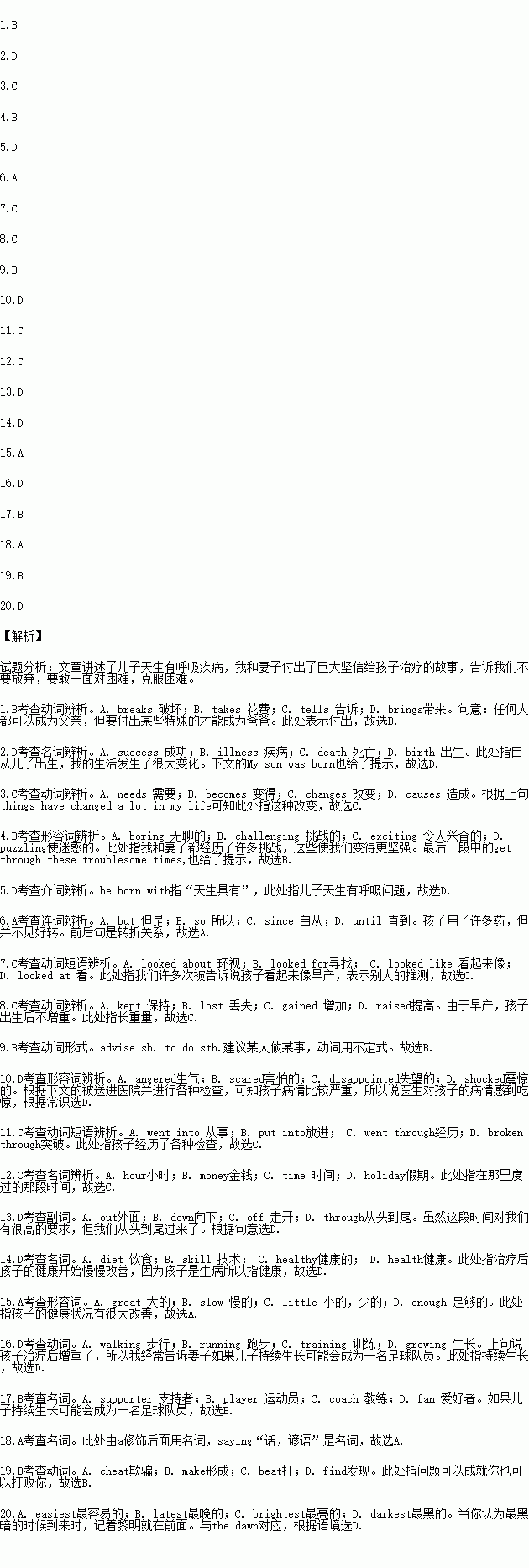题目内容
阅读下列短文,从每题所给的四个选项(A,B, C和D)中,选出最佳选项,并在答题卡上将该项涂黑。
I have always believed that “Any man can be a father, but it ____ someone special to be a dad.” This is true. Since the____ of my son, Joshua, things have changed a lot in my life, but the____ have been good! My wife and I have been through many____ moments which have made both of us stronger.
My son was born ____ a serious breathing problem and he couldn’t keep his medicine down. He was put on several different medications, ____he did not get any better. My wife and I were both told many times by people that Joshua ____he was born early; he had not___ much weight since he was born.
As time progressed his regular doctor advised my wife and me ____ Dr. Eid, a specialist in Louisville. He was____by my son’s condition and so we were sent to Louisville’s Children’s Hospital. Joshua ____many different checkups. The____spent there was very demanding for my wife and me. But we did make it____. Our son Joshua was diagnosed (诊断) with asthma (哮喘), and with acid reflux syndrome (酸回流综合症). After the treatment, his____ began to improve slowly.
Joshua is 1 year and 1 month old now and his progress has been____ he is up to 27 pounds now. I keep telling my wife that if he keeps____ like this he might become a football ____someday. There is a ____ that has helped me get through these troublesome times, “Problems will either___you or break you.” When you think the__35__hours are upon you, remember the dawn is just in sight.
1.A. breaksB. takesC. tells D. brings
2.A. success B. illness C. death D. birth
3.A. needs B. becomes C. changes D. causes
4.A. boring B. challenging C. exciting D. puzzling
5.A. in B. at C. without D. with
6.A. but B. so C. since D. until
7.A. looked about B. looked for C. looked like D. looked at
8.A. kept B. lost C. gained D. raised
9.A. visit B. to visit C. visiting D. have visited
10.A. angeredB. scared C. disappointedD. shocked
11.A. went into B. put into C. went throughD. broken through
12.A. hour B. money C. time D. holiday
13.A. out B. down C. off D. through
14.A. diet B. skill C. healthy D. health
15.A. great B. slow C. little D. enough
16.A. walkingB. running C. training D. growing
17.A. supporter B. player C. coach D. fan
18.A. saying B. says C. said D. say
19.A. cheat B. make C. beat D. find
20.A. easiest B. latest C. brightest D. darkest
 阅读快车系列答案
阅读快车系列答案假如你是李明,对今年频繁出现的严重雾霾感触很深,认为绿色生活方式对于改善空气质量十分有益。请根据下列要点写一篇短文,向校刊“英语角”栏目投稿。
注意:词数100左右;文章开头已给出,不计入总词数。
简述雾霾情况 | 倡导绿色生活 |
持续一周左右 影响全国各地 造成极大不便 | 乘坐公交出行 节约水电纸张 …… |
Greener Life, Cleaner Air
It is not easy to forget the heavy smogs that have occurred frequently this year. _______________________________________________________________________________
_______________________________________________________________________________
_______________________________________________________________________________
_______________________________________________________________________________
_______________________________________________________________________________
_______________________________________________________________________________
_______________________________________________________________________________
_______________________________________________________________________________
_______________________________________________________________________________
_______________________________________________________________________________

